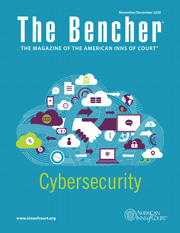Ryan v. U-Drive (Death by Autonomous Vehicle) Third Celestial Circuit
The Bencher—November/December 2020
By Richard K. Herrmann, Esquire

 The issue of security in litigation will continue to grow in importance. It will soon become the substance of many discovery disputes. The following is an excerpt of an opinion that may be written in January 2023 and found within the hypothetical web portal for the Third Celestial Circuit.
The issue of security in litigation will continue to grow in importance. It will soon become the substance of many discovery disputes. The following is an excerpt of an opinion that may be written in January 2023 and found within the hypothetical web portal for the Third Celestial Circuit.
HERRMANN, J—This is a product liability action involving a claimed defect in an autonomous vehicle manufactured by Defendant U-Drive. It is claimed the decedent’s vehicle refused to start and locked its doors because it sensed the decedent was under the influence of a new CyberEnhanced drug. The decedent ultimately died from the drug overdose. Plaintiff claims the unlawful imprisonment by the vehicle contributed to the death. U-Drive has moved for a protective order. Two issues pertaining to the protective order remain unresolved. This opinion relates to issue No.1: The parties cannot agree on the manner in which the plaintiffs should access and manage U-Drive’s confidential electronically stored information (ESI) during this litigation.
The background of U-Drive’s past litigation experiences are important for an understanding of the rationale in this decision. Defendant has been a party in a number of product liability actions in the past. In many of those litigations, the exchange of confidential information was the subject of protective orders limiting use and access to information declared confidential in the terms of the various orders. Unfortunately, U-Drive has found the orders in these cases have not always provided the protection upon which a litigant ought to be able to rely.
U-Drive cites the following among the examples of protective order violations that have compromised defendant’s confidential information:
- In Moore v. U-Drive, a court appointed special master reported on the conduct of a paralegal who engaged in “a pattern of complete disregard for the court orders” and freely distributed protected confidential documents to “various counsel for the plaintiffs.”
- In Bradley v. U-Drive, U-Drive’s confidential documents were hacked by a party and shared among counsel outside the protective order.
- In Toe v. U-Drive (citation omitted), the court found that plaintiffs’ counsel released more than 100 U-Drive confidential documents at a Zoom conference of plaintiffs’ counsel in violation of that court’s protective order.
There is nothing in the record indicating any of the plaintiffs’ counsel in this action had violated any of the orders referenced above. However, as to the Zoom conference referenced in the Toe opinion, it is not disputed one of the counsel for plaintiff in this action attended the Zoom conference and received access to U-Drive confidential documents.
It is clear from the unfortunate history of U-Drive confidential information in other litigation that U-Drive has a reasonable basis to request greater protection from this court. To achieve this protection, a balance must be struck between U-Drive’s needs for added security and the fairness required to permit plaintiffs’ counsel to take advantage of the electronic tools available to manage discovery.
The goal then is to find an approach that would provide U-Drive with some added protection for its confidential information and provide plaintiffs’ counsel in this case with the same flexibility as U-Drive’s counsel—the flexibility to review and share information among themselves. To reach this goal, I believe it is necessary for the electronic documents to be produced and stored in this Celestial Circuit in a system designed to provide access and security for confidential electronically stored information. This court will thus maintain jurisdiction over the documents, as well as jurisdiction over the attorneys of record in this case.
I direct U-Drive to engage, at its sole expense, the services of the electronic discovery vendor CyberLegal to host all confidential documents produced pursuant to the protective order in this action. Access by both parties to confidentially produced ESI (including U-Drive’s access to its own documents) will only be through the CyberLegal system. CyberLegal will arrange for the display of a watermark on every page of every document. The watermark will contain “Confidential by Order TCC 10C-03-151 RKH (XXX)” (where XXX are the initials of the law firm accessing the document). Thus, any document viewed or printed will bear the identity of the party disclosing the document.
IT IS SO ORDERED.
Richard K. Herrmann, Esquire, is director of law and technology and visiting professor at Delaware Law School. He is a Master of the Bench member of the Richard K. Herrmann Technology AIC.